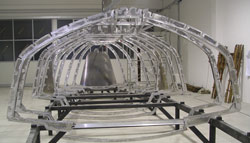
Aluminium is very light and offers an excellent strengh-weight ratio. To give you some idea, aluminium is twice as resistant as fibreglass and 10 times more than marine plywood. Once it has been fitted out, an aluminium boat is 5 to 10% lighter than a fibreglass boat. It’s more expensive than metal but it is far more pliable and, compared to fibreglass, as there is no mould, it’s possible to make variations such as supports for different engines or moving internal bulkheads, making it possible to adapt the design to the clients individual needs. When aluminium receives a knock it is extremely deformable and absorbs energy better. If an aluminium boat knocks against the rocks, for example when it breaks loose from its moorings, it will have some deformities, whereas a fibreglass boat will certainly have faults, which lead to the risk of sinking.
During open sea navigation there is the risk of hitting partially submerged objects: this is one of the reasons why many ocean navigators choose metal boats and especially aluminium because of its lightness. Lastly, aluminium is particularly resistant to corrosion in a marine environment and requires very little maintenance compared with all the other materials (wood, iron or fibreglass). The only danger for a hull in aluminium is galvanic corrosion which can be kept under control by paying careful attention thus avoiding direct contact between the hull and other metals which aren’t the sacrificial anodes, and by means of a carefully designed electrical wiring on board.
Download detail

 Aluminium is very light and offers an excellent strengh-weight ratio. To give you some idea, aluminium is twice as resistant as fibreglass and 10 times more than marine plywood. Once it has been fitted out, an aluminium boat is 5 to 10% lighter than a fibreglass boat. It’s more expensive than metal but it is far more pliable and, compared to fibreglass, as there is no mould, it’s possible to make variations such as supports for different engines or moving internal bulkheads, making it possible to adapt the design to the clients individual needs. When aluminium receives a knock it is extremely deformable and absorbs energy better. If an aluminium boat knocks against the rocks, for example when it breaks loose from its moorings, it will have some deformities, whereas a fibreglass boat will certainly have faults, which lead to the risk of sinking.
Aluminium is very light and offers an excellent strengh-weight ratio. To give you some idea, aluminium is twice as resistant as fibreglass and 10 times more than marine plywood. Once it has been fitted out, an aluminium boat is 5 to 10% lighter than a fibreglass boat. It’s more expensive than metal but it is far more pliable and, compared to fibreglass, as there is no mould, it’s possible to make variations such as supports for different engines or moving internal bulkheads, making it possible to adapt the design to the clients individual needs. When aluminium receives a knock it is extremely deformable and absorbs energy better. If an aluminium boat knocks against the rocks, for example when it breaks loose from its moorings, it will have some deformities, whereas a fibreglass boat will certainly have faults, which lead to the risk of sinking. 
